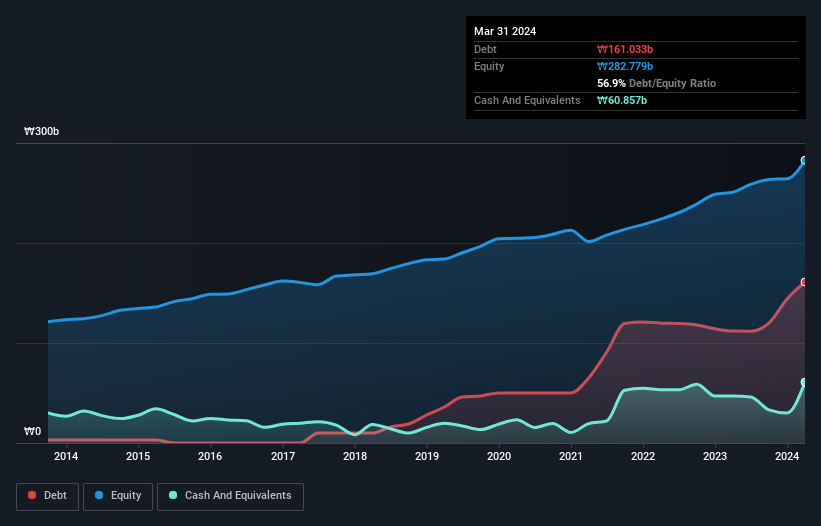- South Korea
- /
- Pharma
- /
- KOSE:A003220
Does Daewon Pharmaceutical (KRX:003220) Have A Healthy Balance Sheet?

Legendary fund manager Li Lu (who Charlie Munger backed) once said, 'The biggest investment risk is not the volatility of prices, but whether you will suffer a permanent loss of capital.' So it might be obvious that you need to consider debt, when you think about how risky any given stock is, because too much debt can sink a company. We note that Daewon Pharmaceutical Co., Ltd. (KRX:003220) does have debt on its balance sheet. But should shareholders be worried about its use of debt?
What Risk Does Debt Bring?
Generally speaking, debt only becomes a real problem when a company can't easily pay it off, either by raising capital or with its own cash flow. Part and parcel of capitalism is the process of 'creative destruction' where failed businesses are mercilessly liquidated by their bankers. While that is not too common, we often do see indebted companies permanently diluting shareholders because lenders force them to raise capital at a distressed price. Having said that, the most common situation is where a company manages its debt reasonably well - and to its own advantage. When we examine debt levels, we first consider both cash and debt levels, together.
View our latest analysis for Daewon Pharmaceutical
What Is Daewon Pharmaceutical's Net Debt?
The image below, which you can click on for greater detail, shows that at March 2024 Daewon Pharmaceutical had debt of ₩161.0b, up from ₩112.0b in one year. On the flip side, it has ₩60.9b in cash leading to net debt of about ₩100.2b.

A Look At Daewon Pharmaceutical's Liabilities
Zooming in on the latest balance sheet data, we can see that Daewon Pharmaceutical had liabilities of ₩218.3b due within 12 months and liabilities of ₩59.9b due beyond that. Offsetting this, it had ₩60.9b in cash and ₩71.2b in receivables that were due within 12 months. So it has liabilities totalling ₩146.1b more than its cash and near-term receivables, combined.
Daewon Pharmaceutical has a market capitalization of ₩351.6b, so it could very likely raise cash to ameliorate its balance sheet, if the need arose. But it's clear that we should definitely closely examine whether it can manage its debt without dilution.
We use two main ratios to inform us about debt levels relative to earnings. The first is net debt divided by earnings before interest, tax, depreciation, and amortization (EBITDA), while the second is how many times its earnings before interest and tax (EBIT) covers its interest expense (or its interest cover, for short). Thus we consider debt relative to earnings both with and without depreciation and amortization expenses.
With a debt to EBITDA ratio of 1.8, Daewon Pharmaceutical uses debt artfully but responsibly. And the fact that its trailing twelve months of EBIT was 8.6 times its interest expenses harmonizes with that theme. Notably Daewon Pharmaceutical's EBIT was pretty flat over the last year. We would prefer to see some earnings growth, because that always helps diminish debt. When analysing debt levels, the balance sheet is the obvious place to start. But ultimately the future profitability of the business will decide if Daewon Pharmaceutical can strengthen its balance sheet over time. So if you want to see what the professionals think, you might find this free report on analyst profit forecasts to be interesting.
Finally, while the tax-man may adore accounting profits, lenders only accept cold hard cash. So it's worth checking how much of that EBIT is backed by free cash flow. Looking at the most recent three years, Daewon Pharmaceutical recorded free cash flow of 47% of its EBIT, which is weaker than we'd expect. That's not great, when it comes to paying down debt.
Our View
On our analysis Daewon Pharmaceutical's interest cover should signal that it won't have too much trouble with its debt. But the other factors we noted above weren't so encouraging. For example, its level of total liabilities makes us a little nervous about its debt. Looking at all this data makes us feel a little cautious about Daewon Pharmaceutical's debt levels. While we appreciate debt can enhance returns on equity, we'd suggest that shareholders keep close watch on its debt levels, lest they increase. When analysing debt levels, the balance sheet is the obvious place to start. But ultimately, every company can contain risks that exist outside of the balance sheet. For instance, we've identified 3 warning signs for Daewon Pharmaceutical that you should be aware of.
If you're interested in investing in businesses that can grow profits without the burden of debt, then check out this free list of growing businesses that have net cash on the balance sheet.
New: Manage All Your Stock Portfolios in One Place
We've created the ultimate portfolio companion for stock investors, and it's free.
• Connect an unlimited number of Portfolios and see your total in one currency
• Be alerted to new Warning Signs or Risks via email or mobile
• Track the Fair Value of your stocks
Have feedback on this article? Concerned about the content? Get in touch with us directly. Alternatively, email editorial-team (at) simplywallst.com.
This article by Simply Wall St is general in nature. We provide commentary based on historical data and analyst forecasts only using an unbiased methodology and our articles are not intended to be financial advice. It does not constitute a recommendation to buy or sell any stock, and does not take account of your objectives, or your financial situation. We aim to bring you long-term focused analysis driven by fundamental data. Note that our analysis may not factor in the latest price-sensitive company announcements or qualitative material. Simply Wall St has no position in any stocks mentioned.
About KOSE:A003220
Daewon Pharmaceutical
A pharmaceutical company, manufactures and sells medicines and medical supplies in South Korea.
Reasonable growth potential with adequate balance sheet.
Market Insights
Community Narratives




